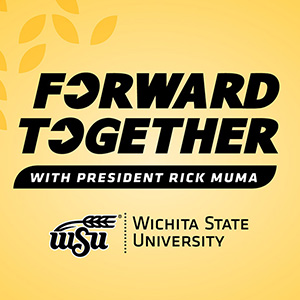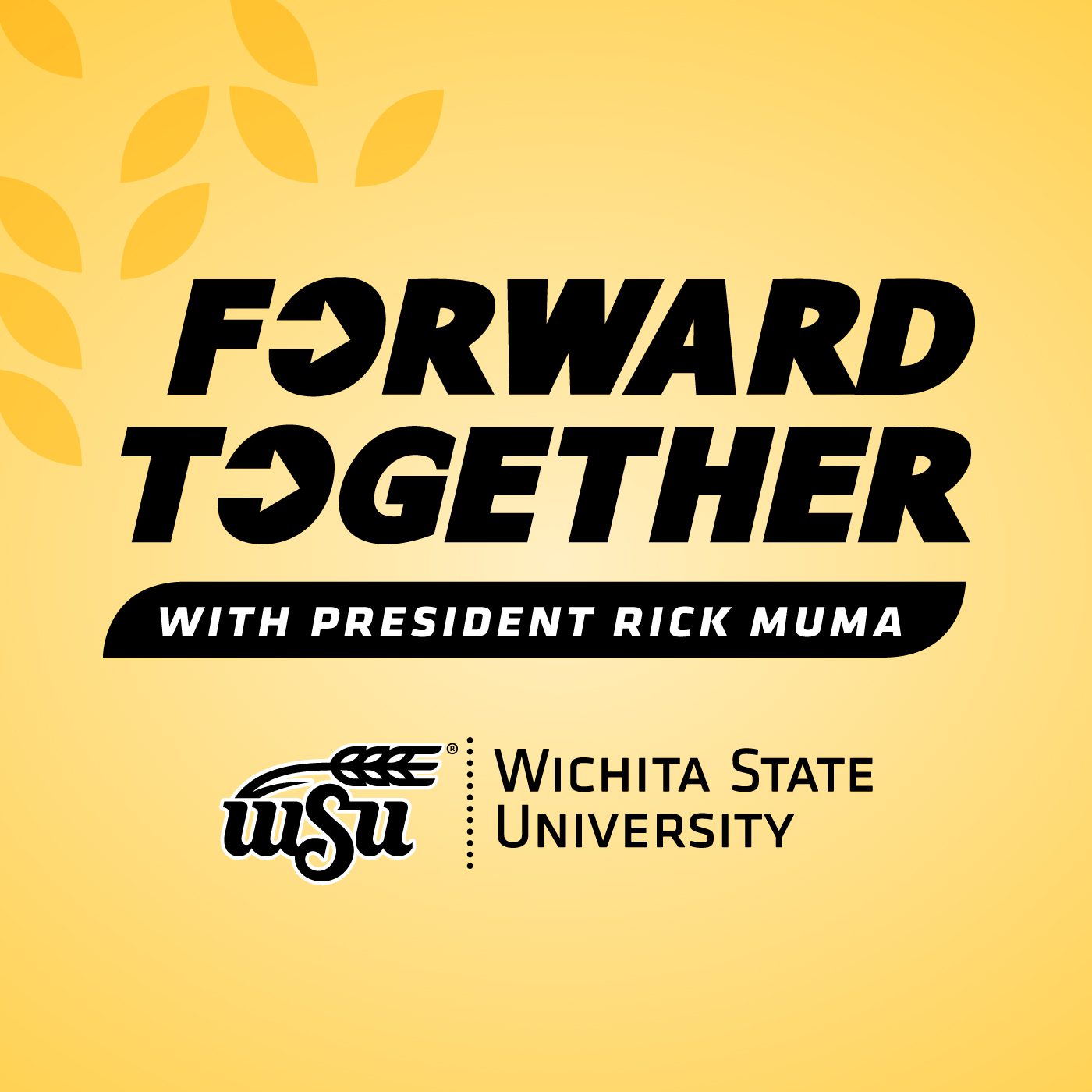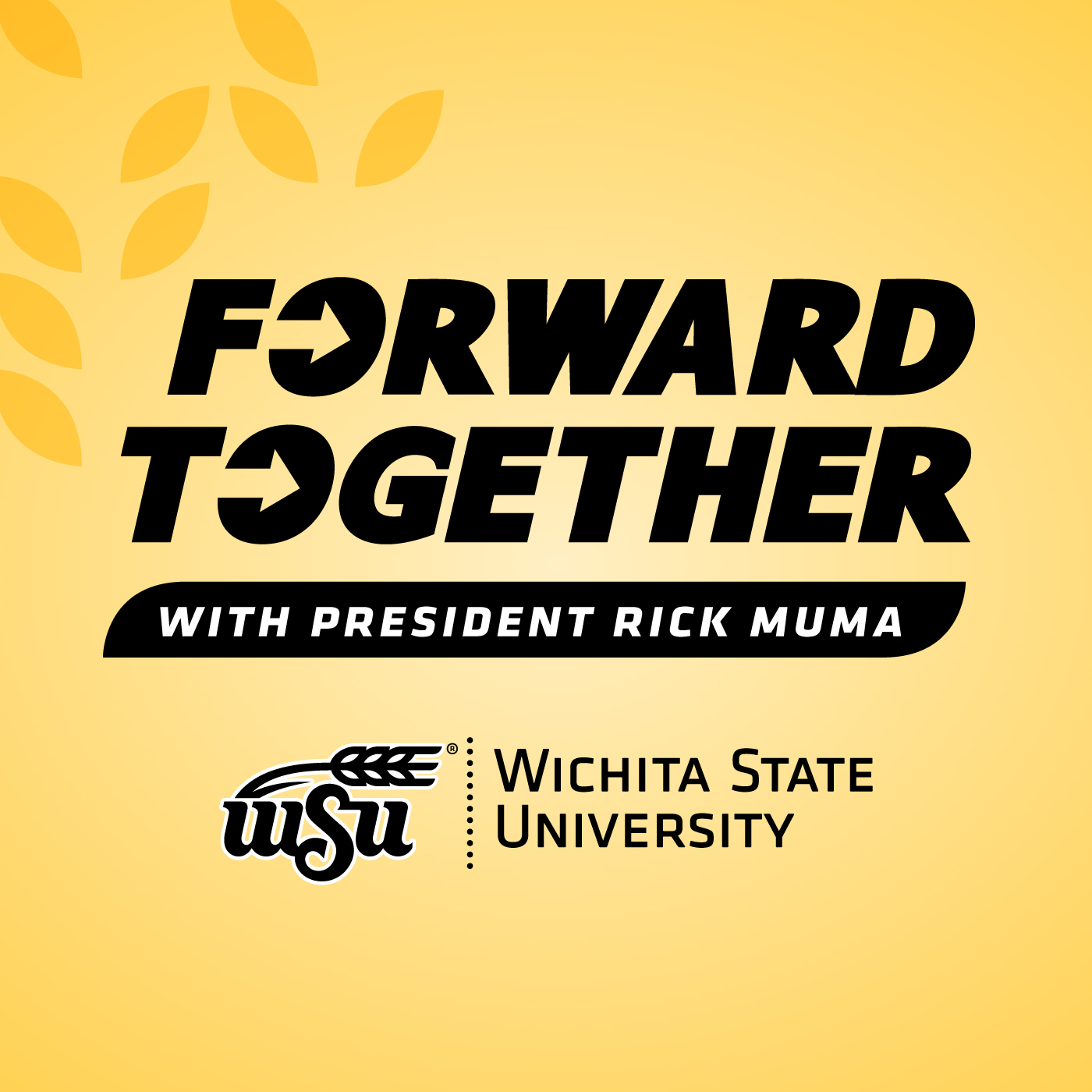Episode Transcript
Speaker 1 00:00:07 Hello, shocker Nation. Welcome to the Forward Together Podcast. My first guest today has spent much of her life doing things that most of us only see in James Bond or Jason Bourne movies. John A. Mendez is the retired chief of disguise for the cia. During her tenure with the cia, she was an expert in disguise identity transformation and clandestine imaging. During her tenure with the cia, she matched witz with intelligent agencies across the globe during the Cold War. He's also a proud shocker having attended Wichita State in the mid 1960s. Good afternoon, Jonna. So good to see you. Thank you for agreeing to join the podcast today. We're very interested to hearing more about what you've been up to since you were in Wichita. So after you left Wichita State, um, as you told me earlier, before we taped this in the late sixties, how did you get connected with the cia?
Speaker 2 00:01:04 Well, it's, um, it's a little bit of a story, as you might imagine. Uh, I didn't even know what the CIA was back then. I don't think I knew. I went to Europe to be in my best friend's wedding. She was marrying, um, an army officer who was stationed in Germany, in Fulda. And so that, that went wonderfully. Uh, after the wedding ceremony, we were all dressed up. We got in tanks and we parade paraded through this little town. Um, and then I was sleeping on their couch for maybe a week when a bell went off that maybe, uh, as they prepared to go on their honeymoon, I should also prepare to leave. So I took a train back to Frankfurt, Germany, and I decided then that I didn't wanna go back to Wichita. So what to do? I was, uh, how old was I? I wasn't very old. Maybe I was 19. I went to the train station, got a pocket full of change, pulled out a phone book in a German phone booth and started alphabetically calling American businesses. So it was, um, banking town. I made four calls. I called the American Consulate. They said, honey, we don't do jobs. We do visas. I called Bank of America. I called American Express, and then I called Chase Manhattan Bank.
Speaker 2 00:02:50 And well, it was interesting. I said, I'm looking for a job. They said, they said, um, do you speak German? I said, no. I said, have you worked in a bank before? I said, no. They said, do you have a work permit? I said, I do not. And they said, why don't you come down and talk to us? And they hired me. So that was how the door, um, to leap forward. There were some Americans coming into that back every week, probably with their paychecks. They were civilians. This was at the time when, when there was an enormous American military presence there. But these were not military people. Uh, so I got to know them and went to some wine festivals with a group of them, started dating one of them, another leap forward. So when he proposed to me in Vienna, Austria, three days before he proposed to me, he told me he worked for the cia. He said, you'll love it. Lots of travel, see the world. And I really liked it. So, so, um, that's how that went. I then was a, a wife of a CIA officer and overseas they will hire you in on a contract basis. So I, I, I wasn't recruited. I kind of came in a side door. There I was.
Speaker 1 00:04:35 I see. So I, and we'll hear more about some of that here in a second. I, I read an interesting and kind of humorous story, uh, about a meeting you had with President George h w Bush, who used to be also the CIA director. Yeah. Um, when you were, um, able and during that meeting or able to show him some of your disguise skills, tell us that version of that meeting. Tell us your version of that meeting.
Speaker 2 00:05:06 That was a meeting that wasn't supposed to happen. I had never intended to take these materials to the White House, but my boss and his boss, they all wanted to. So it was, it was Prince Goof Johnson, Nunu, Bob Gates que came in and I was, um, I was there wearing a mask. It was the end of a 10 year r and d program to develop that mask. We already had used masks over the years, but they were like Hollywood stunt double masks. They looked great, but they didn't move. So if you're in a car, they, they were sufficient, but we needed something that you could actually wear. So I was wearing the second one in the White House. The first one, I was an African American male, looked great. I told, I told him, I can't carry it off though. I'm not a man.
Speaker 2 00:06:17 I don't have a man's voice. So we made a second one. And the second one was the face of a young woman that worked for me who was going to, she was leaving for California. It was her Goodbye. Present was her face. She was cute. She had a great hairdo, cuz that was part of it. This was a whole thing that went on. So I briefed the president and he did not know. Of course he didn't know. We wouldn't, we wouldn't have done it if we didn't think it would work. But I must say when I took it off, it was a moment. He loved it. He just got, I always thought he was a very emotionally kind of flat guy on a, on a TV screen. Well, he was not emotionally flat. He thought this was very fun. John Sununu, who was sitting next to me, he was making all these notes cuz he was gonna go next. He was working on his, he wasn't listening at all, to me, wasn't looking. He looked up, he almost fell off his chair. So I was the first one to brief the president that day. And then I was the first one to leave and go to the outer office. And the White House photographer who had been in there the whole time ing, I think she's always in there, she came out and said, excuse me, what did you do?
Speaker 2 00:07:53 And I said, I can't tell you. It's classified <laugh>. And I think I ticked her off because it took 10 years for that photo to show up in my office. And they had airbrushed, they had airbrushed the mask out. I was holding it up in my hands and instead, I have a picture in my library. They left my fingerman. It looks like I'm lecturing the president. So my friends would come in and see that picture and say, what were you telling him? I know, I say it's classified, I can't talk about it. That was the mask.
Speaker 1 00:08:38 Yeah. Very interesting. Um, you know, as I was sitting here listening to you, we, we actually have had other graduates who've worked for the cia. A um, um, and also the Secret Service. Um, so I don't know what it is in terms, um, some of the, uh, education that we, um, have given our students that have perhaps been connected. But could you tell us, um, what your time here at Wichita State, how that contributed and how, how that may have helped you and, and the, and the kind of work that you ended up doing at the cia?
Speaker 2 00:09:15 You know, when I went to Germany and decided to stay, I wanted to do something that had some meaning to it. This sounds, but I was thinking that way. Something that would make a difference. What would it be? Well, it clearly wasn't gonna be at Chase Manhattan Bank. And I worked briefly at the, uh, a big military hospital. And, and that, that played to my strengths because I had worked for a group of anesthesiologists at Wesley when I was going to Wichita State. That's where my tuition came from. So I had some knowledge, but that still wasn't it jumping into the C cia, I could see an opportunity to do something worth doing and maybe to help make a difference. And I think a lot of your W s U people who find themselves going into these pieces of government, some of them might have the same kind of motivation. I speak every, well, every summer for instance, there's a group of, uh, 1500 young high school graduates that come through in these organized groups. And I speak to them 200 at a time talking about doing something that makes a difference. There's a huge government thing here. You've never even heard of it. Fabulous jobs. I mean, see the world or not, but consider it.
Speaker 1 00:10:53 Yeah. I don't know if you know this, um, uh, with the expansion of the university, it's not exactly related to the, the work of the cia, but we have a very strong school of criminal justice here, um, that has developed all kinds of partnerships with our local, uh, policing agencies, um, uh, the Justice Department and the ATF and, uh, alcohol, tobacco and firearms. And they're moving a gun crime intelligence, or they're de developing a new gun crime, crime intelligence center here on our campus. And it's because of our expertise in criminal justice, some of this related kind of work, um, that has really, um, spurred that. And then also the, the, the work that we have been doing and our research in digital transformation, which, you know, is, it's so important, um, when, when you're doing intelligence type work, from what I've learned, and I'm assuming, um, um, you know, that as
Speaker 2 00:11:52 Well, those things, they, they fit together intelligence and, and, and law enforcement and, and the whole criminal aspect of it. At tf, for instance, I I almost got shot once because they were worried that I was a T f, uh, but then I was a woman and they thought, Hmm, ATF doesn't hire women, do they? So they didn't shoot me. But it's, it's all of a piece and it's, it's, it's all worth doing. We recruit from some of those pools of people. It's a wonderful background.
Speaker 1 00:12:30 Yeah. And that's, that's kind of what I was thinking at and getting at is that, you know, the, the talent pipeline, um, certainly in the work that you do, um, that and what we're teaching here and, and what we're trying to do in terms of the talent pipeline relates to this kind of work in the cia. So I'm very excited to hear, hear about that and get your views on that.
Speaker 2 00:12:50 So one more, one more piece of it though. The CIA was very late to adding the cyber piece to our arsenal of, of skills. We have always had four directorates and now we have a fifth just recently. It's cyber, it's all that technology that we've pulled it together in one place at cia. It's huge.
Speaker 1 00:13:16 Yeah. And that's what we're learning in terms of our expansion of our programming and our, what we're teaching our students. Um, everything's become technology based, digitally based, um, and, and in all of our fields. Um, we just started an applied linguistics program on campus a couple years ago because of the, the need for linguists in, in the 10 actually in the intelligence world. Um, I I'm assuming that you probably know that the CIA hires lots of linguists in terms of their work there. So, um,
Speaker 2 00:13:49 We, we do. Yeah. And we've always been stymied be cause we wanted American citizens, but we always wanted also native or near native language capabilities. There's always been a disconnected.
Speaker 1 00:14:05 Yeah. All right. So what's next for you? Um, I, uh, you've had this great career. You've talked to the president, briefed the president of the United States. Very exciting, I'm sure. Other exciting things that we haven't covered. Um, what does retirement look like for you?
Speaker 2 00:14:24 It's hard. <laugh>, it's busy. Um, you know, once they made the movie Argo about my husband and Tony Mendez that just started this whole piece, peace of interest in, in CIA and in in US. And we lost Tony four years ago. But we've written four books. I've got number five is, it'll be, it, it's to be published in March of 24. And the next one is already written. That's kind of pandemic. That's what you do when you're, you're right, that's what I did. Uh, I was just the, the author in residence at the Ernest Hemingway house in Idaho, 10 days Fabulous. Just came back from Paris where I gave a lecture at the Serone University. I mean, it just, it doesn't seem to be slowing down. And, and Tony and I were part of building out the International Spy Museum in Washington, dc Um, and I'm still on the board. I expect I'll be on the board until I drop dead or get cile.
Speaker 1 00:15:48 Yeah. Well that's, that's great. That's fantastic. Um, glad to, to hear that. I'd be remiss if I didn't ask about your husband and the movie Argo. And as, uh, could you briefly discuss a little bit about that so the listeners can understand that connection?
Speaker 2 00:16:06 I've discovered that most people have seen the movie Argo. I just took a foreign intelligence group through the spy museum this last week. The head of the service and 12 other people, they don't even speak English, but they have seen Argo. Tony never meant to tell that story. That's just one story of a whole bag full of stories. But George Tenant insisted that he tell that story and that, that he tell it to the New York Times. And then it just developed a life of its own, turned into a movie. Uh, George Clooney bought the rights. Clooney was going to write it, direct it, produce it, and star in it, his big appetites. And, and all he did was produce it cuz he got stuck in another movie. So Ben Affleck took it over and we think he did a great job. And the CIA thinks he did a great job.
Speaker 2 00:17:13 Oh my God. It's actually a good story about the cia. Uh, everybody wants to know, is it, is it true to the, the details? And of course they change details. They do it all the time. For instance, Tony had three children that, that was his first marriage. I wasn't married to him when that happened. He lost his wife. I lost my husband. But that first marriage, he had three kids. But in the movie they made it one because to make the storyline compact. And while the other two kids have never, never forgave <laugh>, it was their moment and they got wiped out of the movie. Um, we still hear from the six house guests. They're all still around. The last couple just retired from State Department. So we get Christmas cards and see them occasionally. It was an amazing thing and the fact that it was immortalized was just, it broke. It broke every wall that there is at CIA a and they loved it.
Speaker 1 00:18:32 Well, I've seen the movie. I suggest those who haven't, who are listening, they need to go see that movie cuz we have a connection here today, here on our podcast. John, it was really good to talk to you. Um, very, uh, interesting life that you've led and it started here in Wichita and a connection to Wichita State. Um, I hope that we can see you sometime back here in Wichita. Uh, if you do hap happen to come back, please stop by and we'll visit some more.
Speaker 2 00:19:01 I think I'll make a point of it.
Speaker 1 00:19:02 Yes. So, so good to meet you. Thank you for being,
Speaker 2 00:19:05 Love talking to you.
Speaker 1 00:19:09 On the next edition of the Forward Together podcast. Join me when I talk to some of our current shockers about their experiences learning, working, and growing at Wichita State. Thank you for joining me today. And remember to rate, review, and subscribe wherever you listen to the THD Together podcast.


